Rice And Arsenic, Is It A Problem?
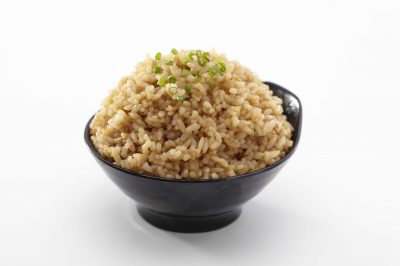
It is always interesting to dig deeper into the many stories that swirl around nutritional studies. There is always some new insight into the miracle properties of an individual food, vitamin or mineral that is the secret to long life and health. The same is true with horror stories of food toxicity. All these reports are said to be a result of exhaustive scientific studies and are instantly picked up by the popular press and sensationalized. The truth is often buried in the process.
Months ago, there were a series of headlines generated out of a report in Consumers Report warning of the dangers of eating rice. The threat was that rice was polluted with arsenic. Arsenic!! Damn - that’s a fatal poison. We don’t want that in our food.
As is often the case, the issue was more complicated and much less sensational when we dig deeper into the fact. What emerges is a far more interesting story that implicates many environmental issues, misrepresented science, sensational use of simple science and an insight into the limits of myopic science. Some helpful links are below so you can get a well-rounded vision of why good quality brown rice is still an excellent choice as a healthy food for all seasons.
John McDougall MD our friend and colleague, explains in great detail the nutritional value of this inexpensive, high-energy, health-promoting staple.
https://www.drmcdougall.com/2014/12/31/arsenic-in-rice/
The second excellent article is by Julia Ferre, for Macrobiotics Today
https://ohsawamacrobiotics.com/images/earticles/Arsenic-in-rice.pdf
And the third article another good source from Alex Jack
https://www.9starki.com/arsenic_report.htm
So, why pick on rice?
"Rice contributes 17 percent of dietary exposure to inorganic arsenic, which would put it in third place, behind fruits and fruit juices at 18 percent and vegetables at 24 percent" Still rice has become the "must avoid" food. Consumers Reports, November 2012 - And, there is arsenic in fruit juices too.
Short grain brown rice is our daily staple, has been for decades. Delicious, nutritious, top drawer food for health and longevity.
In good health
Thai Pumpkin & Sweet Potato Chickpea Coconut Curry
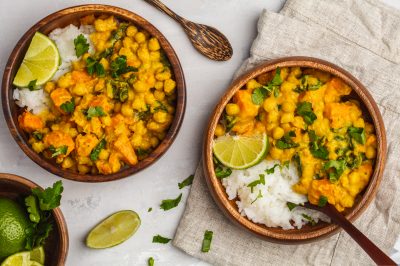
I love the saying Hara Hachi Bu: Stop Eating When You’re 80% Full. The Okinawan elders have used this phrase for centuries before beginning their meal. It's a perfect reminder to stop eating when our stomachs are 80 percent full. We ask all our students who come to study with us to build this awareness into their daily lives when eating breakfast, lunch and dinner.
Many of us eat way too fast, hardly chewing our food at all. It's almost like, bite, swallow, done! when watching some people eat. This causes not only digestive issues but also weight gain as you eat way too many calories. A good idea is to use chopsticks, it makes you take smaller mouthfuls. Another idea is to put your utensils down in between each mouthful of food and really chew. It's also good to remind ourselves that the people of Okinawa, have the longest living people on the planet and the largest population of centenarians.
Here is a tasty dish to allow you to try this way of eating slower whilst savouring each delicious mouthful. This is a lovely curry that sings with all the splendour of comfort. The curry sauce is thickened with coconut cream which adds that touch of richness. Try it and see just how truly wonderful eating slowly and really tasting the food can be.
For the Curry Sauce:
1 ½ cups coconut cream
3 garlic cloves,
1 x inch piece ginger, peeled and chopped
2 tsp. ground coriander
1 tsp. ground cumin
1 tsp. mild curry powder
1 tsp turmeric
Juice from two limes
2 tbsp. tamari
1 tbsp umeboshi paste
For the Broth
1 sachet umami instant stock dissolved ¼ cup warm water
3 kaffir lime leaves (whole)
2 cups pumpkin or squash, peeled and chopped into bite size pieces
4 cups sweet potato chopped into bite size pieces
1 ½ cups cooked chickpeas
½ cup coconut cream
1 large bunch of kale, leaves only, chopped and steamed
Serving
Small handful coriander or basil leaves, fresh for garnish
Lime slices
Place all curry sauce ingredients together in a blender. Blend well to create a fragrant yellow sauce. Pour the curry sauce into a heavy based wok. Add the dissolved umami instant stock, plus the lime leaves, stirring to incorporate. Stir in the pumpkin and sweet potato. Bring to a boil then reduce heat to a low simmer. Stir in the chickpeas, cover and allow to simmer 20 minutes, or until the vegetables are soft enough to poke through with a fork. Meanwhile, steam the kale for 4-5 minutes until vibrant green.
Add the remaining half cup of coconut cream and taste, adjusting flavours to suit your palette. Add a little chili if you desire a spicy curry. Stir in the steamed kale and add a little more liquid if you desire a more 'soupy' texture. Transfer the curry into a serving dish, or into individual bowls. Top with a sprinkling of fresh coriander or basil. Serve with white basmati, Thai jasmine rice or millet and some lime slices.
You will find over 80 delicious recipes in my latest book Go Vegan. My book is jam packed with nutritional information, ancient wisdom coupled with nutritional science and the foreword written by T. Colin Campbell Center for Nutrition Studies.
In good health
Immune Boosting Shiitake Mushrooms
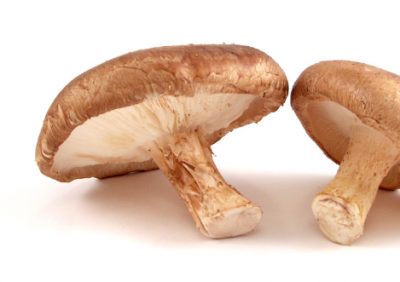
Biologists consider shiitake and other mushrooms to be fungi, a group of primitive plants. Since they have no green pigments (chlorophyll), they cannot make food from sunlight as other plants, but must live by eating plants. Shiitake’s favourite food is dead hardwood trees. The word “shii” is derived from the shii tree (Quercus cuspidate), an oak of central and southern Japan upon which shitake most often grow. “Take” means mushroom in Japanese (it is repetitious to say “shiitake mushroom”).
Ancient Foods For Modern Cooks
The part of shiitake that we eat, the fleshy cap, is actually a primitive reproductive structure of the plant that produces billions of microscopic spores. When two compatible spores get together, they fuse their cytoplasm and genetic material and, if food is available, grow into a new mushroom. When two compatible spores combine, they form the mycelium. In the case of shiitake, mycelium grows inside the log, using its powerful enzymes to transform wood into food. After a period of time, environmental stresses such as food depletion or temperature and humidity changes cause the mycelium to form a reproductive structure-the mushroom-and the cycle is complete.
In early autumn, as trees shed their leaves in preparation for a dormant winter, the carbohydrate level in the tree trunk rises, making an ideal food for shiitake growth.
Beginning in the 1960’s, scientists launched an extensive search to uncover the secret of shiitakes legendary healing powers. Their studies-about one hundred in all-focused on shiitake’s ability to rapidly lower serum cholesterol, as well as this mushroom’s potent antitumour, antiviral and antibiotic properties.
Shiitakes and Immunity
Many of the human diseases currently increasing throughout the world have no specific cures. Immune-system failure or dysfunction is a common element in cancer, viruses and immune-deficiency diseases. Many scientists around the world contend that there is increasing evidence that the health-promoting compounds found in medicinal and edible fungi, including shiitake, stimulate the immune system. The temperatures of cooking do not seem to destroy shiitakes healing qualities, in addition, cooking greatly enhances the mushrooms flavour. You can cook fresh shiitake in all the ways you are used to enjoying other mushrooms in soups, stews, sauces and gravies. The dried shiitake mushrooms I use in many of my recipes from my latest book Go Vegan not only taste amazing but they will build your immunity.
In good health
Happy New Year 2021

For many 2020 has been an annus horribilis a well-known Latin phrase, meaning "horrible year". It is complementary to annus mirabilis, which means "wonderful year" and Bill and I have high hopes and positive energy to do our bit to make 2021 the annus mirabilis for all, humans, nonhumans and our planet.
As the year draws to a close, it is a natural time for reflection, for reviewing the many challenges we have endured and stay focused on our visions for how we see our future. Amidst all the fear and loss by many around the globe, we are encouraged in particular, by our many students who, having completed their studies, are ready to take care of family, friends, colleagues and clients and guide them on the path to renewed health.
The new possibilities are endless and looking at ways of how we can all work together to make this world a better and healthier place for future generations knows no bounds. This will not come from governments, but from individuals who have the vision and the passion to bring about a new way of living.
In this new year ahead, we are filled with gratitude for all our students, clients and colleagues who inspire us and we look forward to helping many in 2021 to find their calling. To be in service for a healthy world brings the greatest joy and to me that is a blessing in itself. It only takes one grain of sand to turn the tide, that grain of sand is you.
We believe in the power of small acts. There is a resistance by many to believe in the power of individuals to create significant change. This is often used as a braking mechanism by those with vested interest in maintaining power. This is no time for pessimism, it is a time for action. In the words of anthropologist Margret Mead, “Never doubt that a small group of thoughtful, committed citizens can change the world. Indeed, it is the only thing that ever has”.
In good health
Seasons Greetings From Bill & Marlene

2020 has been a very challenging and unforgettable year to say the least. Our wishes for everyone this Christmas is to stay safe and to take care of each other and your loved ones. We are inspired and so passionate about our work and believe it will help many to discover the ways we can all help ourselves to good health.
To reach out to those in need, not only at Christmas time but through the spirit of generosity that humans possess is the way forward. With a sharing and caring attitude that we are all connected to our community and our planet, is as always our focus.
Thank you for supporting our work. Please enjoy this delicious pudding and have fun making it during the holidays.
Vegan Christmas Pudding
This pudding is so much lighter than the heavy dense puddings of the past.
2 tightly packed cups dried fruit, raisins, cherries, cranberries & blueberries
2 cups dried dates, chopped
1 cup dried apricots, chopped
⅓ cup brandy or port, dark rum, sherry, if alcohol free use apple juice
⅓ cup all-purpose flour/plain flour or gluten free flour
¾ cup breadcrumbs
2 tsp baking powder
1 tsp allspice
½ cup coconut sugar
½ cup apple sauce/puree
Zest of 1 large orange
5 tablespoons aquafaba (the liquid from a can of chickpeas)
2 tablespoons barley malt
Equipment
16cm pudding basin
Parchment paper
Baking foil
String
Heavy based pot
Soak the dried fruit in a large mixing bowl with your choice of liquid, stir to mix and set aside for 30 minutes. Oil the pudding basin with a little oil and place a small circle of parchment paper in the bottom of the basin. Add the flour, breadcrumbs, baking powder, allspice and sugar to the dried fruit bowl and stir well to combine. Stir in the orange zest, apple puree/sauce, aquafaba and barley malt Mix well to combine. Spoon the mixture into the pudding basin, smooth it out and top with a circle of parchment paper, pressing down the sides into the bowl.
Cut a piece of baking foil and parchment paper to go over the top of the pudding basin with plenty to spare. Lay the foil flat on a surface and the parchment paper flat on top of the foil. Make a pleat in the middle of the paper and foil. Cover the top of the pudding basin with the foil and paper with the pleat in the middle and press down firmly. Tie the string tightly around the basin.
Cooking Instructions:
Steamer:
Make sure the water is simmering well under the steamer insert. Place the pudding in the insert and cover with the lid. Cook for 3 hours.
Saucepan:
Place the pudding gently on an upturned saucer inside the pan and pour boiling water carefully down the sides so it reaches about halfway up the side of the pudding basin. Cover and bring to a simmer. Cook for 3 hours. When the time is up, carefully removing the pudding from the pot, take off the foil and parchment paper. A toothpick should come out clean when inserted.
To Serve:
Either serve immediately with some delicious vegan cream or ice cream or leave to cool completely with the paper and foil removed but still in the bowl.
In good health
How To Manage Stress & Live A Long Happy Healthy Life
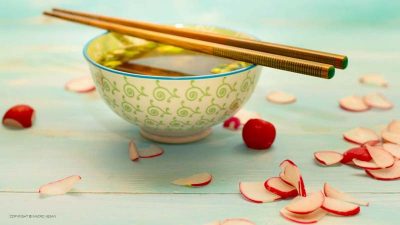
There have been more changes in the last 50 years to the western diet than in all of human evolution and the experiment is clearly not working. It took 50,000 years to reach a human population of one billion in 1830. We soared above six billion in the year 2000 and passed seven billion in 2012. Wealthy nations eat increasing amounts of meat, while nearly one billion people go hungry. Agribusiness ignore the nutrient cycle, and rather than rebuilding soil, they saturate it with petrochemicals. Soil is over-tilled, overgrazed, made toxic and infertile, and turned into desert. One-third of all farmable land is now degraded. That is the deadly cost of a heavy animal based diet and contributes to our nutritional stress that is killing our gut flora. Soil and man are not separate.
How does stress affect us?
One of the main effects of stress is that it affects our adrenal glands. These glands produce the hormones adrenaline, nor epinephrine, DHEA and cortisol. When we go through life in a state of emergency the adrenals become overworked and we become prone to anxiety and stress responses.
What is the difference between stress and burnout?
When the adrenals become over-worked they eventually cannot produce hormones in sufficient amounts or cannot utilize the hormones they do produce, basically the adrenals get wiped out. This is called adrenal exhaustion (burnout). This state of exhaustion is emotional, mental and physical.
Are people becoming more stressed?
In this 24/7 busy, busy, busy existence people become more stressed due to the increased reliance on caffeine containing products like coffee and fizzy drinks, as well as chemicals in foods and excess sugar. When health is not good we become less adaptable. The over-use of mobile phones and computers, lack of being in an outdoor environment and not getting enough physical exercise also contribute.
How can we learn to manage our stress?
Adopting a wholefood natural vegan diet can make the biggest impact on stress. When we eat food it should energize us, and create vitality and adaptability. What we eat today is who we are tomorrow. By removing animal foods, processed and fast food from our diets will make the biggest impact on stress at a cellular level. We do not hear about nutritional stress but it is very real.
Ill health in any form comes from a weakened system. The problem is the food. Instead of a healing nature of blood that should be flowing through our tissues we eat foods that create or exacerbate inflammation. This is true for all who have had decades of eating a diet of animal foods. It comes as a major shock for many to hear that dairy and eggs are more acidic than meat. When you eat an egg, you are eating a whole animal.
Why do people seem to be more reluctant to deal with their stress, or admit it’s a problem whereas they will happily spend and commit to weight loss?
We live in a world where it seems the more stress you have to deal with the more important you are, it’s almost like wearing a ‘badge of courage’ kids even talk about being ‘stressed out’. We are setting ourselves up for illness if we do not address these issues. When the body becomes overwhelmed (stressed) it’s a signal to take stock and listen to the message.
Weight is often seen as a cosmetic issue, or obsession with appearance, when it often overrides more serious health issues. We are miraculous in our design; the body is a self-healing organism so when we eat in a way that nourishes us from the inside out we are better geared up to deal with life on a daily basis.
The money that is wasted on weight loss products is perhaps one of the most ridiculous marketing scams of the 21st century. Cortisol as I mentioned above is produced by the adrenals when we are stressed, the interesting point to note here is that Cortisol is a fat storing hormone, any wonder then why people find it hard to lose weight?
At MACROVegan we have a programme designed to address all of these issues. Weight Loss Nature’s Way, Reverse Diabetes, The Natural Woman and The Great Escape to name but a few. All our programmes address issues on stress, weight gain and non-communicable diseases. Our latest books How To Eat Right & Save The Planet and Go Vegan are packed with all you need to remove stress and live a long happy and healthy life.
How can food help us de-stress?
Natural un-processed foods in their whole-form are packed with every vitamin and mineral to create a healthy equilibrium that does not cause stress to the body. The modern diet is a strange mix of chemical additives and the excessive use of fats, protein and sugars. This mix puts the body under a constant pressure to either store or detoxify acids and fats. This is a constant battle within us to achieve the constant state of chemical balance that keeps us alive – we are fighting ourselves. When we treat the body kindly and only eat foods that are easy to digest and metabolize, it is like tuning in a clear channel on the radio and getting rid of the static.
Here is what I do to combat stress
“If you don’t take care of your body, where are you going to live?” This has been my mantra for over two decades. Stress ages our cells, robs us of good health and kills us before our time. It is a downward spiral. What I teach my clients is how to reverse this spiral and bring back homeostasis.
It is easy to deal with stress in such a simple way. I work hard, play hard, but rest also. Balance is the key to a healthy and happy life. Eating good healthy food, fun exercise, short 5-minute sessions of deep breathing and relaxation/mediation every day keep the stress to a minimum is my ritual. If you create healthy habits stress is not an issue.
In good health
The Easy Vegan Kitchen
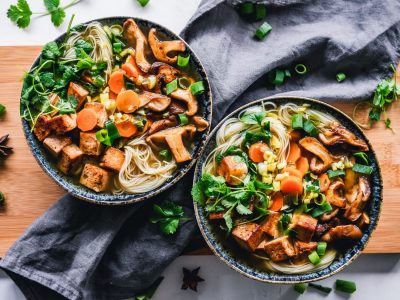
Here are some of my top tips to make your easy vegan kitchen work for you. The kitchen cupboard is the nerve centre of your kitchen - keep it well stocked and you will save time dashing to the shops for that single ingredient and will always have a delicious meal at hand even when the fridge is looking bare. For example, store purchased organic beans make a great addition to soups and make tasty dips that can be literally on the table in 10 minutes. You will find many delicious quick recipes in my latest book Go Vegan available world-wide on amazon.
Marlene’s Quick Bites and Roll-Overs
Cook Once – Eat Twice
Time savers are a great way to cook your food. Cook double and use the rest for tomorrow’s lunch. Cook more than you need and freeze the rest. A good idea is to freeze in small portions, so you have ‘ready-made’ meals when time is of the essence.
- Make a weekly menu plan, it makes it possible to use leftovers efficiently and makes meal preparation simpler.
- Make double the sauce and use for another dish later in the week.
- Salad dressings are easy to prepare in larger batches. Depending on the dressing, it will keep for at least a week, although some can be stored for a month or longer. Dressings are versatile and can be used not only on salads but to also dress up simple vegetable and grain dishes and adds a quick boost of flavour.
- Cut fresh vegetables enough for several days so that all the cutting is done, and you can cook quickly.
- Alternately peel and chop carrots, onions, etc., bag them and freeze. When needed, just take out as much as you require and reseal.
- Mince fresh garlic and keep it in the refrigerator for ready use. Minced garlic will keep for about two weeks in the refrigerator in a sealed container.
- Juice some fresh lemons or limes at a time and store the unused juice in the refrigerator in a sealed container. This will time when putting together salads, dressings, and other recipes. Fresh lemon juice will keep for about 10 days.
- Beans will last three days after being cooked. Cook enough beans to use in a soup, stew or casserole. I cook up batches of azduki beans and freeze them in portions.
- Grains will last up to five days in a glass sealed container in the refrigerator. I make our short grain brown rice porridge in one batch for breakfast that lasts us through the working week. I simply warm the required amount each morning for breakfast. Grain and beans are good to re-use with a nut or seed garnish but make the vegetables fresh.
- Prepare larger amounts of brown rice, beans, and other longer-cooking foods and freeze them in small portions so they will defrost more quickly when you need them and will be the right amount required for the number of people you will be serving.
- Learn how to use a pressure cooker. Pressure cooking can cut standard cooking times by about two-thirds while preserving more nutrients than conventional cooking methods.
- Purchase some good organic soup stock cubes. I use miso bouillon stock that instantly delivers a delicious base for all my soups.
- Sea vegetable dishes last for days. Cook up a good amount and then use a small portion every other day. I switch between, arame, hijiki and nori.
- Always have some wholegrain pasta (brown rice is good), bulgur, couscous and other partially refined grains at hand for last minute meals.
- Have a stock of organic cooked beans and other foods on hand for when you get stuck.
- Choose two new recipes from your cookbooks every week so that you are constantly expanding you range of dishes and your familiarity with the foods.
- Adding some raw food to each meal is a winner and it’s simple as no cooking required!
Short Cuts to Healthy Eating for Busy People!
Most people think you are tied to the kitchen when you eat this way but if you organise yourself you can spend literally 20 minutes in the kitchen and have a delicious meal ready by having prepped and stored various items like vegetables, grains and bean dishes and soups beforehand. As you will see from the above quick tips, a breakfast, lunch or dinner can be put together in no time at all. It is all about planning ahead and being organised. Storing and reheating cooked food makes it possible to assist you in serving delicious healthy meals in as little as 10 minutes.
Using soba, udon, quick cooking grains, lightly boiled or steamed vegetables are all quick ways to cook something tasty up in no time.
Miso soup should be taken daily as this will help to alkalize the body: ‘Miso Broth’ quick version, recipe in my book Go Vegan. The added ginger juice will increase your cells sugar uptake, help with digestion and circulation. Make a batch of this to last you for 3 or 4 days. Miso soup with wakame and a side dish of steamed greens such as kale and collards, creates a sense of calm. I love it and live it daily. Any wholegrain porridge along with a few seeds and some ground flax and shelled hemp will set you up for the morning. You can also watch me making miso soup with vegetables on my cooking video channel.
In good health
World Vegan Day
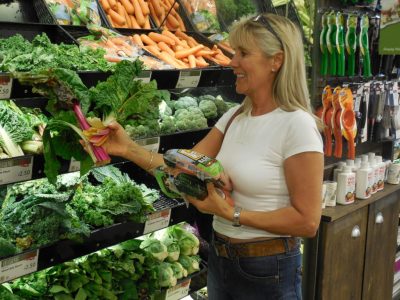
How a wholefood plant-based vegan life can transform your life and our world.
As the author of the definitive vegan cookbook Go Vegan and a dedicated health counsellor and teacher, I look at some of the reasons behind the growing popularity of veganism for World Vegan Day. However, world vegan day should be every day. Our animal kingdom are here with us, not for us.
World Vegan Day is an annual event celebrated by vegans around the world every 1st November. The event was established in 1994 by Louise Wallis, then Chair of The Vegan Society in the UK, to commemorate the 50th anniversary of the founding of the organisation and the coining of the terms "vegan" and "veganism".
The benefits of veganism for humans and the natural environment are now well recognised, with many high-profile celebrities endorsing it as a way of life. The word vegan comes from the Latin word Vegetus, which means strength of mind and body, and there is much evidence to support veganism as a way to improve both physical and mental wellbeing. Many sports stars have grasped veganism as a way of life including tennis champions Venus and Serena Williams, Formula 1's Lewis Hamilton, footballers Jermain Defoe and Jack Wilshere and former world champion heavy-weight boxer David Haye.
The latest figures show that there are around 100 million vegans globally. If we can all recruit one person to Go Vegan we will see a huge surge in that number. This is a very exciting prospect and we have a plan to engage as many people as we can to get involved.
So what is fuelling this movement towards veganism?
Human activity is causing environmental degradation, which is the deterioration of the environment through depletion of resources such as air, water and soil; the destruction of ecosystems; habitat destruction; the extinction of wildlife; and pollution. It only takes one grain of sand to turn the tide. That one grain of sand is each and every one of us. We can make a tremendous difference and minimize our impact on land and water resources by referring to four distinct areas: human, social, economic and environmental - known as the four pillars of sustainability. It’s simple in its essence that a sustainable world would meet the needs of everyone. We should all be able to meet our own needs without compromising the ability of future generations to meet their own needs. We are depleting our natural resources and education is the only way to reverse this downward spiral.
For the animals
Ending the exploitation of animals is not the only reason for becoming vegan, but for many it remains the key factor in their decision to go vegan and stay vegan. Having emotional attachments with animals may form part of that reason, while many believe that all sentient creatures have a right to life and freedom. Specifics aside, avoiding animal products is one of the most obvious ways you can take a stand against animal cruelty and animal exploitation everywhere.
Save the environment
Many people have adopted a vegan lifestyle because it's better for the environment. Meat-based diets use more resources, including land, water, and energy to produce food, and create twice as many greenhouse gas emissions than the production of plant-based foods.
Improve health and physical fitness
We are living in difficult times. The need to understand health and have the skills to lead an earth friendly way of life has never been so important. The health benefits of a vegan diet are plentiful with a focus on wholegrain, beans, vegetables from land and sea, fruits, nuts and seeds. Many of these foods offer fibre, antioxidants, and several essential nutrients. Consuming an animal-based free diet means a decrease in saturated and trans-fats, which can contribute to heart disease, diabetes and other chronic conditions.
The body uses amino acids to build and repair muscle and amino acids are the building blocks of protein. All plants contain protein, which builds and maintain body tissue. Plant-based protein sources contain fibre and complex carbohydrates which make them a more powerful fuel for the body. Plants can help to improve cardiovascular health, overall endurance and muscle growth, while also providing more energy and reducing recovery time after physical exercise.
Improve mental health and wellbeing
Managing mental health and wellness is an issue regularly reported in the media. There is no one cause of mental illness and often it is unclear. According to the World Health Organization, more than 264 million people of all ages suffer from depression. Connecting the gut and brain to mental health is a fascinating area of research. The gut-brain connection is now recognised as a basic tenet of physiology and medicine. There is no shortage of evidence that what we eat is an important factor in a variety of neurological diseases. What has been discovered is that gut bacteria play a significant role in psychology and behaviour as well as digestion.
The human gut contains almost 95% of the body’s serotonin, “the happy chemical” neurotransmitter that helps regulate mood, social behaviour, sleep, memory, and sexual desire. A lack of serotonin is an important factor in depression. Production of this essential chemical depends on the micro-organisms in the gut that are nourished by our diet. Our physical condition can either help us manage our mental state or exacerbate the stress we encounter. The key to this mystery may be inflammation. The foods which most exacerbate inflammation are those that are mostly present in processed foods. These include simple sugars, fructose, dairy foods, eggs, alcohol, meat, hydrogenated fats, palm oil and some fruits and vegetables such as tomato and pineapple. Eating a diet rich in antioxidants, a plant-based diet, has a profound benefit in stress reduction. Eating a diverse and balanced vegan diet can produce profound changes in the gut biome within days, and our mental wellbeing.
Weight loss
Recent NHS research has highlighted that that one in three people in the UK are obese, and there has been much publicity about the risks of being overweight during this pandemic. People are seeking a better understanding of what different foods do to their bodies in the desire to lose weight. One path to sustainable weight loss and good health is to eat a wholefoods plant-based vegan diet. Grains are a major source of calories, protein, vitamins and minerals and a US study has found that some cultures that have based their dietary principles on grains, beans and vegetables have no weight issues until adopting a standard western diet. Along with my husband Bill Tara, I have been expounding the benefits of a vegan way of life for decades. Go Vegan is available world-wide and is packed with nutritional advice and tasty recipes. The Chinese version of Go Vegan is selling well and I now have a publisher in India.
Our online MACROVegan Health Coach Course is focused on providing a learning experience for everyone who wants to contribute to a healthy world. Unlike other similar courses on plant-based nutrition, this course delves deeply into the ancient wisdom of this approach to understand the impact it has on our world today.
With the start of National Vegan Month beginning on the 1st November, I encourage everyone to adopt this way of life for humans and nonhumans alike. There is nothing new under the sun. As I mentioned above, it only takes one grain of sand to turn the tide.
Join Bill and I in service for a healthy world right now and be that grain of sand that turns the tide for future generations.
In good health
Prince William Launches Earthshot

Prince William launches £50m drive to repair the planet. The Duke of Cambridge has announced that £50m will be awarded over 10 years through his Earthshot prize, billed as “the most prestigious global environment prize in history”, which aims to find solutions to repair the planet by 2030.
The Earthshot Prize will award five £1m prizes each year over the next decade. Prizes will be awarded in five categories: protecting and restoring nature, including saving species from extinction; tackling air pollution such that everyone in the world breathes clean air; reviving oceans and ensuring that they can be used sustainably; reducing waste by ensuring that “the leftovers of one process become the raw materials of the next”; and managing climate change by building a carbon-neutral economy. Each “Earthshot” is underpinned by scientifically agreed targets, including the UN Sustainable Development Goals.
Individuals, groups of scientists or activists, businesses, governments, or even cities or countries may submit their proposals. So, as always, I write to them, I send our books How To Eat Right & Save The Planet being the question and Go Vegan being the answer.
Keep It Simple
Why must we always look beyond what can be done today, right now, in your own kitchen, to me, that is what we need to be promoting. The biggest form of mass destruction to human health and the devastation that we witness daily to our planet lies at the end of our forks. Please watch and share Bill's short video on environmental damage and the food we eat.
One of the major causes of climate change is the environmental damage caused by food production. The consumption of animal sourced foods is one of the main drivers of climate change and undermines both human health and creates a negative environmental impact. It all comes down to our food choices. We can choose food which is not only healthy but beneficial for environmental stability and sustainability or we can eat in a way which creates irreversible damage.
My Monthly YOGA Magazine Article
On another note, I have made a short video with my most asked for dessert from my Tasty Tips For Kids workshop. A perfect treat for halloween for kids and adults alike. You will find my article on Vegan For Kids in this month's YOGA Magazine available globally.
Join Us Online And Be A Much Needed Lighthouse
Our MACROVegan Online Coaching Course has got off to a fantastic start. It's something we have wanted to do for many years. COVID-19 pushed us along the path to make that happen and we have some fantastic reviews and powerful videos from students around the world sharing their experience of working with us online.
Please join Bill and I in service for healthy world for humans and nonhumans alike. It is our passion and pleasure to continually share our life's work and bring about change that our world needs.
In good health
National Curry Week
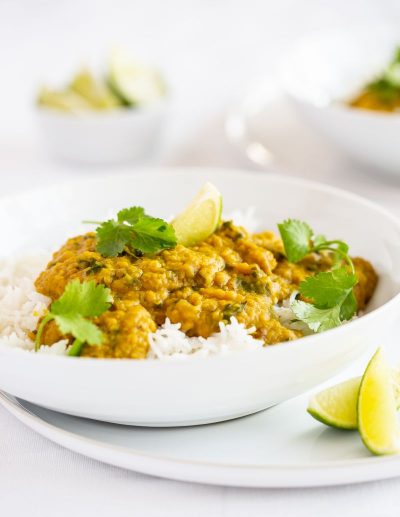
Vegan dishes are perfect for celebrating National Curry Week
The 22nd National Curry Week takes place from the 5th to 11th October 2020. Founded by the late Peter Grove, a prominent journalist who had fallen in love with curry, his vision was to drive awareness and appreciation of the burgeoning Indian restaurant industry, whilst also raising funds for charity.
It has often been said that curry is the “national dish” of Britain with curry houses becoming a staple of the high street since the 1970’s. As millions of curries are consumed every single week, National Curry Week is an opportunity for the British to celebrate their love of all things curry. With the extensive use of herbs and spices, vegan curries have become a popular healthier, but equally as tasty, alternative to meat dishes, and this week is the perfect time to try something new.
Marlene Watson-Tara, author of the definitive vegan book Go Vegan says, “many people are turning to a vegan diet in the desire to live a healthier life, with a focus on wholegrain, beans, vegetables from land and sea, fruits, nuts and seeds, and these ingredients work particularly well in spicey curries.”
Marlene suggests trying her red lentil coconut curry, a warming curry in the South Indian style, flavoured with aromatic fresh ginger, cumin and coriander. It’s made extra creamy and luscious thanks to the addition of organic coconut milk.
Recipe:
Red Lentil Coconut Curry
3 shallots, finely chopped
1 tbsp fresh ginger, peeled and minced
2 cloves garlic, minced
1 tsp cumin seeds
1 tsp mild curry powder
½ tsp ground coriander
½ tsp turmeric
Pinch sea salt
2 cups filtered water
1½ cups red lentils
1 cup organic coconut milk
2 medium-sized courgettes, diced into ½ inch (1 cm) pieces
1 or 2 tbsp tamari
1 cup loosely packed fresh coriander leaves, chopped
Lime slices
In a heavy-based pan, cook the shallots, ginger and garlic in a splash of filtered water for 5 minutes, stirring occasionally. Add the spices and salt and stir well. Stir in the water, lentils and coconut milk. Allow the mixture to simmer over a low flame, covered, whilst stirring occasionally for 10 minutes. Stir in the courgette and tamari, cover and cook until courgette and lentils are tender. Add more water to reach the desired consistency. Taste-test then stir in the coriander. Serve the curry with white or brown basmati rice to round out this comforting meal. Makes 4–6 servings.
In good health




